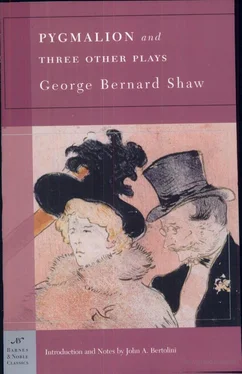THE SOLDIER AT THE THEATRE FRONT
In 1915, I saw in the theatres men in khaki in just the same predicament. To everyone who had my clue to their state of mind it was evident that they had never been in a theatre before and did not know what it was. At one of our great variety theatres I sat beside a young officer, not at all a rough specimen, who, even when the curtain rose and enlightened him as to the place where he had to look for his entertainment, found the dramatic part of it utterly incomprehensible. He did not know how to play his part of the game. He could understand the people on the stage singing and dancing and performing gymnastic feats. He not only understood but intensely enjoyed an artist who imitated cocks crowing and pigs squeaking. But the people who pretended that they were somebody else, and that the painted picture behind them was real, bewildered him. In his presence I realized how very sophisticated the natural man has to become before the conventions of the theatre can be easily acceptable, or the purpose of the drama obvious to him.
Well, from the moment when the routine of leave for our soldiers was established, such novices, accompanied by damsels (called flappers) often as innocent as themselves, crowded the theatres to the doors. It was hardly possible at first to find stuff crude enough to nurse them on. The best music-hall comedians ransacked their memories for the oldest quips and the most childish antics to avoid carrying the military spectators out of their depth. I believe that this was a mistake as far as the novices were concerned. Shakespeare, or the dramatized histories of George Barnwell, Maria Martin, or the Demon Barber of Fleet Street, [272] George Barnwell is a sinner in George Lillo’s middle-class sentimental tragedy The London Merchant (1731); Maria Martin is the heroine of Maria Martin, or the Red Barn Mystery, about her murder by her lover in 1827; Sweeney Todd is the legendary “Demon Barber” of London, who slit his customers’ throats.
would probably have been quite popular with them. But the novices were only a minority after all. The cultivated soldier, who in time of peace would look at nothing theatrical except the most advanced post-Ibsen plays in the most artistic settings, found himself, to his own astonishment, thirsting for silly jokes, dances, and brainlessly sensuous exhibitions of pretty girls. The author of some of the most grimly serious plays of our time told me that after enduring the trenches for months without a glimpse of the female of his species, it gave him an entirely innocent but delightful pleasure merely to see a flapper. The reaction from the battle-field produced a condition of hyper-aesthesia in which all the theatrical values were altered. Trivial things gained intensity and stale things novelty. The actor, instead of having to coax his audiences out of the boredom which had driven them to the theatre in an ill humor to seek some sort of distraction, had only to exploit the bliss of smiling men who were no longer under fire and under military discipline, but actually clean and comfortable and in a mood to be pleased with anything and everything that a bevy of pretty girls and a funny man, or even a bevy of girls pretending to be pretty and a man pretending to be funny, could do for them.
Then could be seen every night in the theatres old-fashioned farcical comedies, in which a bedroom, with four doors on each side and a practicable window in the middle, was understood to resemble exactly the bedroom in the flats beneath and above, all three inhabited by couples consumed with jealousy. When these people came home drunk at night; mistook their neighbor’s flats for their own; and in due course got into the wrong beds, it was not only the novices who found the resulting complications and scandals exquisitely ingenious and amusing, nor their equally verdant flappers who could not help squealing in a manner that astonished the oldest performers when the gentleman who had just come in drunk through the window pretended to undress, and allowed glimpses of his naked person to be descried from time to time. Men who had just read the news that Charles Wyndham [273] Actor-manager of the period (1837-1919).
was dying, and were thereby sadly reminded of Pink Dominos [274] French farce adapted into English by James Alberry (1838-1899).
and the torrent of farcical comedies that followed it in his heyday until every trick of that trade had become so stale that the laughter they provoked turned to loathing: these veterans also, when they returned from the field, were as much pleased by what they knew to be stale and foolish as the novices by what they thought fresh and clever.
Wellington said that an army moves on its belly. So does a London theatre. Before a man acts he must eat. Before he performs plays he must pay rent. In London we have no theatres for the welfare of the people: they are all for the sole purpose of producing the utmost obtainable rent for the proprietor. If the twin flats and twin beds produce a guinea more than Shakespeare, out goes Shakespeare and in come the twin flats and the twin beds. If the brainless bevy of pretty girls and the funny man outbid Mozart, out goes Mozart.
Before the war an effort was made to remedy this by establishing a national theatre in celebration of the tercentenary of the death of Shakespeare. A committee was formed; and all sorts of illustrious ous and influential persons lent their names to a grand appeal to our national culture. My play, The Dark Lady of The Sonnets, was one of the incidents of that appeal. After some years of effort the result was a single handsome subscription from a German gentleman. [275] Reference to Sir Carl Meyer, who donated £70,000 to the National Theatre in 1908.
Like the celebrated swearer in the anecdote when the cart containing all his household goods lost its tailboard at the top of the hill and let its contents roll in ruin to the bottom, I can only say, “I cannot do justice to this situation,” and let it pass without another word.
THE HIGHER DRAMA PUT OUT OF ACTION
The effect of the war on the London theatres may now be imagined. The beds and the bevies drove every higher form of art out of it. Rents went up to an unprecedented figure. At the same time prices doubled everywhere except at the theatre pay-boxes, and raised the expenses of management to such a degree that unless the houses were quite full every night, profit was impossible. Even bare solvency could not be attained without a very wide popularity. Now what had made serious drama possible to a limited extent before the war was that a play could pay its way even if the theatre were only half full until Saturday and three-quarters full then. A manager who was an enthusiast and a desperately hard worker, with an occasional grant-in-aid from an artistically disposed millionaire, and a due proportion of those rare and happy accidents by which plays of the higher sort turn out to be pot-boilers as well, could hold out for some years, by which time a relay might arrive in the person of another enthusiast. Thus and not otherwise occurred that remarkable revival of the British drama at the beginning of the century which made my own career as a playwright possible in England. In America I had already established myself, not as part of the ordinary theatre system, but in association with the exceptional genius of Richard Mansfield. In Germany and Austria I had no difficulty: the system of publicly aided theatres there, Court and Municipal, kept drama of the kind I dealt in alive; so that I was indebted to the Emperor of Austria for magnificent productions of my works at a time when the sole official attention paid me by the British Courts was the announcement to the English-speaking world that certain plays of mine were unfit for public performance, a substantial set-off against this being that the British Court, [276] In the person of King Edward VII, who attended Shaw’s play John Bull’s Other Island (1904).
in the course of its private play-going, paid no regard to the bad character given me by the chief officer of its household.
Читать дальше












